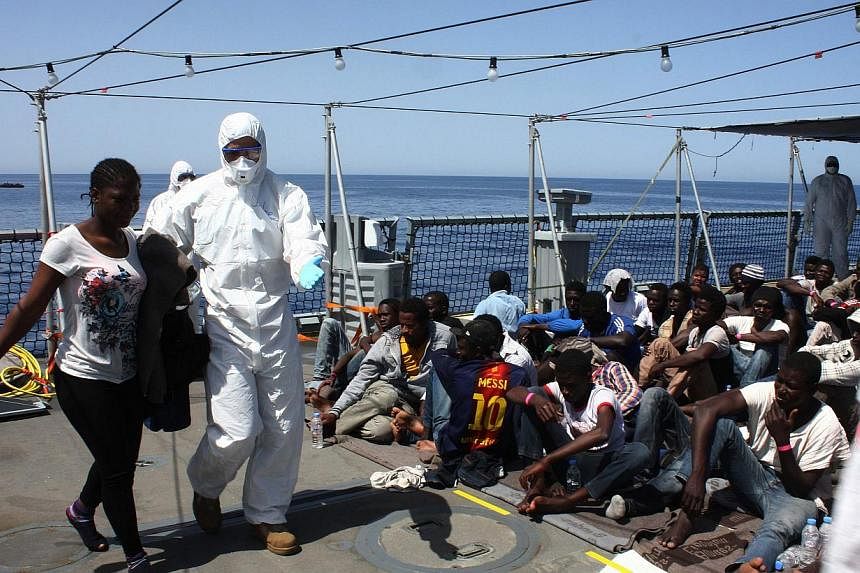BRUSSELS (AFP) - European Union (EU) ministers are set to approve plans on Monday for an unprecedented naval force to fight people smugglers in the Mediterranean after a series of shipwrecks killed hundreds of migrants.
The ambitious operation starting in June will involve the deployment of warships and surveillance aircraft off the coast of Libya, the epicentre of the humanitarian disaster unfolding on Europe's southern shores.
The EU plan also includes the possible destruction of smugglers' boats before they reach European shores, although that requires a United Nations Security Council resolution backing military action.
Federica Mogherini, the EU diplomatic chief, said approval from the European foreign and defence ministers at a "very intense" meeting in Brussels on Monday would help push the UN into action.
"Today the main point will be taking the decision to establish the EU operation at sea to dismantle the criminal networks that are smuggling people in the Mediterranean," Mogherini told reporters.
"I think that after we take the decision today it is more likely for the Security Council to take a resolution."
She has however insisted there is no question of EU "boots on the ground" in Libya, where political chaos and the rising threat of Islamic State in Iraq and Syria (ISIS) militants make it the main launching point for people risking their lives to cross the sea.
5,000 migrants dead
More than 5,000 migrants, many escaping civil war in Syria, have died over the past 18 months while trying to cross from North Africa, often on flimsy rubber dinghies or crowded fishing boats.
Britain, France, Germany, Italy and Spain have already promised to deploy warships for the mission, a rare joint military venture for the 28-nation European bloc that prefers political and financial gambits.
"The Royal Navy is already saving lives at sea but we need to agree action today to get after the criminal gangs," British Defence Minister Michael Fallon said as he arrived for the talks.
German Defence Minister Ursula von der Leyen said that while rescue operations at sea would remain the EU's first priority, it had to tackle the roots of the problem.
"Even if sea rescue operations will stay our top priority, we have to address at the same time the causes, which bring people to venture on this high-risk escape over the sea," she said.
Rights groups have however criticised the military plan, saying it will not solve the problem of complex smuggling networks and of a huge number of people fleeing war and poverty.
Andrew Stroehlein of Human Rights Watch said it was "utter madness".
The headquarters of the mission, called EU Navfor Med, is to be in Rome and will be led by Italian Rear Admiral Enrico Credendino, a European diplomat told AFP.
Brussels wants to take the operation step-by-step, starting by collecting intelligence on the traffickers by using radar, satellite pictures and reconnaissance flights and raiding unflagged boats.
If the EU wants ships from its members states to enter Libyan waters or capture a boat flying a foreign flag, it needs the green light from the UN under international law.
Britain, France oppose quotas
The naval operation is part of a wider EU blueprint launched last week which envisaged sharing the migrant burden more evenly among member states and increased cooperation with source countries to help stem the tide of people seeking a better life in Europe.
Pressure has grown on governments to act after an overcrowded migrant boat sank in the Mediterranean last month, leaving more than 750 dead in a case that sparked international outrage.
But parts of the plan - particularly quotas for distributing asylum seeker arrivals around the EU - are causing deep divisions.
Britain says it will not take part in the quota system and has called for economic migrants to be pushed back to where they came from.
It received unexpected support from French Prime Minister Manuel Valls, who rejected the quota plan at the weekend, while Hungary, Poland, the Czech Republic, Estonia, Latvia, Lithuania and Slovakia have also spoken out against them.
Reports at the weekend that the ISIS group is trying to smuggle fighters into Europe by hiding them amongst genuine migrants has added to the sense of panic over quotas.

